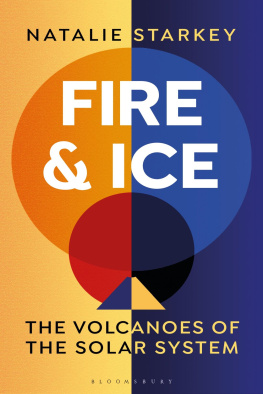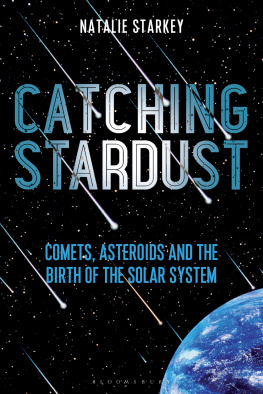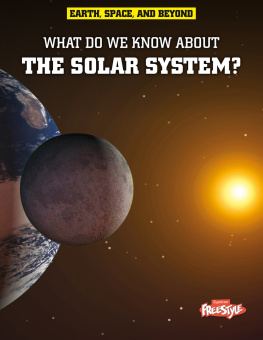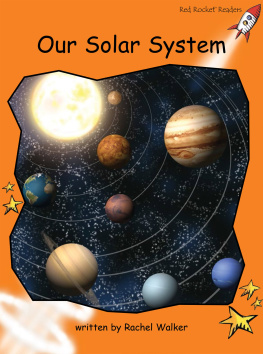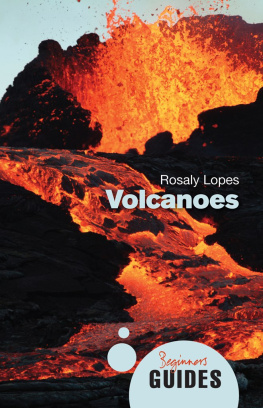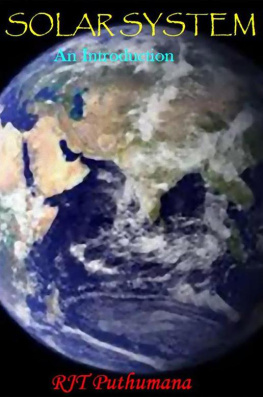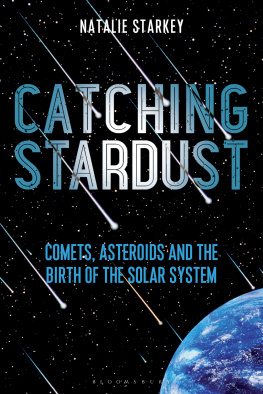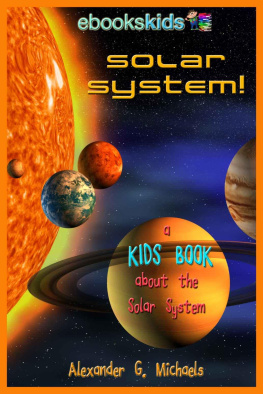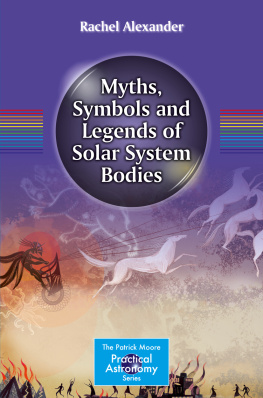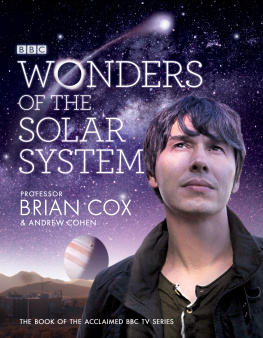Natalie Starkey - Fire and Ice The Volcanoes of the Solar System.
Here you can read online Natalie Starkey - Fire and Ice The Volcanoes of the Solar System. full text of the book (entire story) in english for free. Download pdf and epub, get meaning, cover and reviews about this ebook. year: 2021, publisher: Bloomsbury Publishing Plc, genre: Religion. Description of the work, (preface) as well as reviews are available. Best literature library LitArk.com created for fans of good reading and offers a wide selection of genres:
Romance novel
Science fiction
Adventure
Detective
Science
History
Home and family
Prose
Art
Politics
Computer
Non-fiction
Religion
Business
Children
Humor
Choose a favorite category and find really read worthwhile books. Enjoy immersion in the world of imagination, feel the emotions of the characters or learn something new for yourself, make an fascinating discovery.
- Book:Fire and Ice The Volcanoes of the Solar System.
- Author:
- Publisher:Bloomsbury Publishing Plc
- Genre:
- Year:2021
- Rating:3 / 5
- Favourites:Add to favourites
- Your mark:
- 60
- 1
- 2
- 3
- 4
- 5
Fire and Ice The Volcanoes of the Solar System.: summary, description and annotation
We offer to read an annotation, description, summary or preface (depends on what the author of the book "Fire and Ice The Volcanoes of the Solar System." wrote himself). If you haven't found the necessary information about the book — write in the comments, we will try to find it.
Fire and Ice The Volcanoes of the Solar System. — read online for free the complete book (whole text) full work
Below is the text of the book, divided by pages. System saving the place of the last page read, allows you to conveniently read the book "Fire and Ice The Volcanoes of the Solar System." online for free, without having to search again every time where you left off. Put a bookmark, and you can go to the page where you finished reading at any time.
Font size:
Interval:
Bookmark:


Also available in the Bloomsbury Sigma series:
Sex on Earth by Jules Howard
Spirals in Time by Helen Scales
A is for Arsenic by Kathryn Harkup
Suspicious Minds by Rob Brotherton
Herding Hemingways Cats by Kat Arney
The Tyrannosaur Chronicles by David Hone
Soccermatics by David Sumpter
Goldilocks and the Water Bears by Louisa Preston
Science and the City by Laurie Winkless
Built on Bones by Brenna Hassett
The Planet Factory by Elizabeth Tasker
Catching Stardust by Natalie Starkey
Nodding Off by Alice Gregory
The Edge of Memory by Patrick Nunn
Turned On by Kate Devlin
Borrowed Time by Sue Armstrong
The Vinyl Frontier by Jonathan Scott
Clearing the Air by Tim Smedley
Superheavy by Kit Chapman
The Contact Paradox by Keith Cooper
Life Changing by Helen Pilcher
Kindred by Rebecca Wragg Sykes
Our Only Home by His Holiness The Dalai Lama
First Light by Emma Chapman
Ouch! by Margee Kerr & Linda Rodriguez McRobbie
Models of the Mind by Grace Lindsay
The Brilliant Abyss by Helen Scales
Overloaded by Ginny Smith
Handmade by Anna Ploszajski
Beasts Before Us by Elsa Panciroli
Our Biggest Experiment by Alice Bell
Worlds in Shadow by Patrick Nunn
Aesops Animals by Jo Wimpenny
For C.W., K.W. and Charlie

Contents
As many an author has said, writing a book is a rather solitary endeavour. Yet this book has kept me company, moving countries with me and my family from California, USA, to the UK, and putting up with three house moves. It got put on the back burner for a year while I flew off to write a planetarium space show in New York, but was there waiting for me when I returned. It has even dealt with a global pandemic. Nevertheless, this book eventually got written and the breaks from writing Ive had to take over the two and a half years working on it helped to give me some perspective.
I absolutely love the process of writing, shutting myself away in the office for hours on end to research and write about these fascinating Solar System worlds. Towards the end of this book, when the Covid-19 lockdown began and I had my daughter at home all day, it would have been easier to take another break from writing. But, thanks to the commitment of my amazing husband, who took the reins on childcare at the weekends, I was able to continue pushing through the words to complete my first draft. This gave me such joy (and a break from the endless hours of entertaining my daughter) and a big boost to know I had the space to think during such unprecedented times. This book kept me going, as well as Joe Wicks PE lessons on TV!
In terms of proofreading, first thanks will always go to my father Colin Starkey, who is, as always, the first to have read the first draft at the stage when Im still not really ready for anyone to see any of it! Then Ive had a whole raft of friends who have kindly offered their time to check the English and, just as importantly, the science. Whether they read one chapter or the whole thing, I am truly grateful for their help to make this book better. So, thank you to: Tess Mize, Wendy Tomlins, Rhian Meara, Ashley King, Jack Wright, Helen Cooke and last, but not least, Susanne Schwenzer.
I thank my daughter for being such a ray of light during the hard times. Every time she excitedly recites the names of the planets in order, she reminds me why I do this. I want everyone to love learning about space as much as I do, and I hope that my readers will enjoy this book and feel inspired to learn more.
Like many of you, when I first studied the planets, it was accepted that there were nine of them. Pluto was still classed as a fully fledged planet, yet we only had a very blurred image of its surface and knew even less about what went on there. I was school age at the time the world started learning in more detail about the planets in the outer Solar System, including their many and varied moons. This was because we were in the process of visiting them with spacecraft for the first time and analysing the data being returned. What was found was completely unexpected. None of the places that our spacecraft visited and observed looked and behaved as wed imagined. These places were worlds in their own right, with active surfaces being the norm, and the concept of completely barren, lifeless planets became more and more unlikely.
Ive always been fascinated by the planetary objects that orbit closest to the Sun, the so-called terrestrial, or rocky, planets: Mercury, Venus and Mars, and our only natural satellite, the Moon. In terms of distance they are close to Earth, but these objects are also close to our planet in many other ways, being made of the same rocky starting materials and hosting similar-looking features on their surfaces, such as mountains and valleys. I was always amazed that these worlds once hosted volcanoes that were just like some of those we have on Earth today; they had erupted hot, molten rock that reformed their surfaces. This is the case even for the Moon, which today is an apparently dead or dormant grey rock. Yet, while weve explored the Moon in some detail with spacecraft, including landers and orbiters, and weve even sent humans there, the idea of humans investigating the other rocky planets is still some time in the future, if it ever happens. These objects might be close to us, but the conditions that exist on their surfaces, whether extremes of pressure or temperature, make the prospect of exploring them very challenging.
This brings me to the objects beyond the inner Solar System, the so-called gas and ice giants of the outer Solar System: Jupiter, Saturn, Uranus and Neptune, and the many moons that surround them. These enormous planets are nothing like our own; they dont have solid surfaces for us to land upon even if we managed to design a craft that could withstand the extreme conditions of such worlds. Some of the most important missions for improving our understanding of these places were the un-crewed Voyager spacecraft that ventured out as part of NASAs so-called Grand Tour of the Solar System. Voyager 2 launched just a few weeks ahead of Voyager 1 in 1977, and because they were sent on different trajectories, Voyager 1 reached its target first. They explored Jupiter and Saturn initially, before the missions were extended to take in Uranus and Neptune as well. Today, they continue their journey into the unknown, exploring the region beyond our planets and at the outer limits of the Suns sphere of influence. They are currently the most distant human-made objects from Earth.
The two Voyager spacecraft beamed back images of planets and moons of which we knew very little, such were the huge distances of these objects from our own planet. To date, they also remain the only spacecraft to have visited Uranus and Neptune. Despite the fleeting fly-bys provided by the Voyager spacecraft, their visits gave us a vast insight into what these places look like and how they behave, with some surprising revelations. As Voyager swung by the largest planetary bodies in our Solar System, finding out, for example, that Jupiters Great Red Spot was a complex raging storm, we found that our planet was not the only one with an interesting, and long, story to tell.
Font size:
Interval:
Bookmark:
Similar books «Fire and Ice The Volcanoes of the Solar System.»
Look at similar books to Fire and Ice The Volcanoes of the Solar System.. We have selected literature similar in name and meaning in the hope of providing readers with more options to find new, interesting, not yet read works.
Discussion, reviews of the book Fire and Ice The Volcanoes of the Solar System. and just readers' own opinions. Leave your comments, write what you think about the work, its meaning or the main characters. Specify what exactly you liked and what you didn't like, and why you think so.

